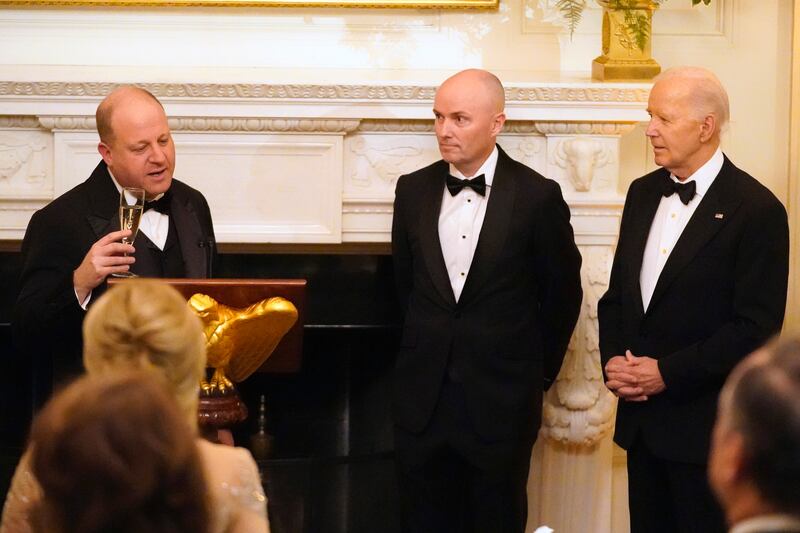Utah Gov. Spencer Cox spoke on behalf of the nation’s governors on Monday to condemn a Biden administration proposal to relocate close to 1,000 National Guardsmen without governors’ approval.
As chairman of the National Governors Association, Cox appeared with Colorado Gov. Jared Polis, his vice chair, to detail how a Department of Defense recommendation for Congress to circumvent state leaders and give the Space Force control of 14 National Guard units across seven states would override longstanding U.S. law and lead to increased federal control of the state militias.
“This is part of a broader historical push to federalize the guard,” Cox told reporters during a virtual press conference. “If history has taught us anything, the Department of Defense will try again in the future to reduce guard force structure without involving governors.”
The nation’s governors have found unanimous bipartisan agreement on this one issue, Cox said, because the proposal was crafted without input from governors, and it would contribute to a precedent of federal overreach and leave states less prepared to address crises.
“In terms of numbers on paper, it may appear negligible,” Cox said, “but in terms of how this could affect the guard in the future, and how it can affect the Space Force in the near term, it really could be significant.”
What does the Air Force want with 1,000 National Guardsmen?
Cox, a Republican, and Polis, a Democrat, have led a push by the executives in all 55 U.S. states and territories to push back against the blueprint legislation, which the Department of Defense recommended to the Senate Appropriations Committee’s defense subpanel on March 29 to include in the fiscal year 2025 spending package.
The draft bill would empower the Air Force secretary to change the status of a National Guard unit to a Space Force unit, potentially deactivate the unit or assign it to a new federal mission, all without state lawmakers’ input.
U.S. law found in Title 32 and Title 10 has long held that a National Guard unit within a state cannot be changed, withdrawn or relocated without the approval of the governor of the state.
On April 9, Cox and Polis released a statement decrying the “erosion of Governor authorities” in the face of federal encroachment. Three weeks later, the two leaders mobilized 53 governors (excluding Texas and Florida) in signing a letter to the President Joe Biden-appointed Secretary of Defense, Lloyd Austin.
“Legislation that sidesteps, eliminates or otherwise reduces Governors’ authority within their states and territories undermines longstanding partnerships, precedence, military readiness and operational efficacy,” the letter read.
Florida Gov. Ron DeSantis and Texas Gov. Greg Abbott, whose states both have major space sectors, joined their colleagues on Friday with separate letters stating their opposition to the Department of Defense proposal.
“All 55 governors are affected; to say that only seven that have active space guards are affected is simply not correct and understates it,” Polis said during Monday’s press conference. “This is a major federalization of the state National Guard and a change in the military force structure with implications for all of the states.”
Polis referenced an internal poll conducted among Air National Guard service members that found over 70% of them would consider retiring or retraining before they would transition to the Space Force. Forcing members of the National Guard to make that decision would harm the relationship between them and their states, and between the Department of Defense and governors, Cox said.
What do the Air National Guard and Space Force do?
Members of the Air National Guard, stationed in Colorado, California, New York, Florida, Ohio, Hawaii and Alaska, play a growing role in military drone operations and data analysis, according to the Center on Foreign Relations.
The Air National Guard provides 30% of the country’s space operations units and 60% of its electromagnetic warfare response, the National Guard Association reported. The guardsmen also use satellite systems to help direct responses to wildfires and natural disasters, Polis said.
The Space Force became the newest branch of the military in 2019 when it was created to maintain U.S. superiority in space. In the years since, service members, lawmakers and governors have debated whether the Air National Guard should be incorporated into the Space Force, be made into a separate Space National Guard organization or be left alone.
Air Force Secretary Frank Kendall has argued that incorporating the Air National Guard into the Space Force would centralize the country’s response to space threats. But the proposal would be unpopular with National Guard service members and is a step in the wrong direction for the United States of America, Polis said.
“It would decrease our readiness in the space domain,” Polis said. “And perhaps more importantly, the precedent is extremely dangerous. ... This is a break with the traditional authority that governors have over National Guard units in our own states and a dangerous precedent on the slippery slope towards federalization of our state National Guard resources.”


